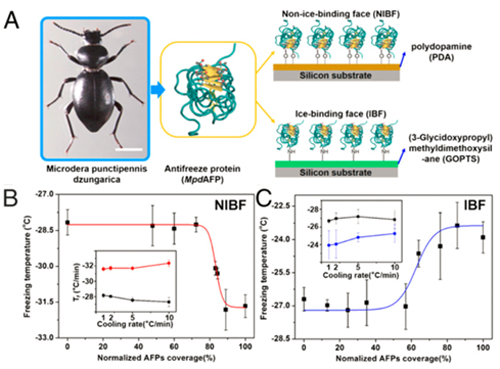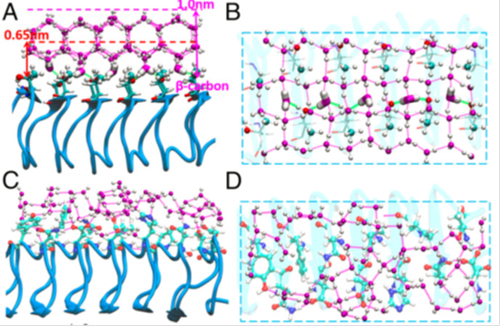Scientists discover Janus effect of antifreeze proteins on ice nucleation
Antifreeze proteins (AFPs) protect a broad range of biological organisms inhabiting subzero environments via controlling ice formation. Since the discovery of AFPS in 1960s, a vast body of experimental and theoretical works has been undertaken to investigate the molecular level mechanism of the AFPs in controlling ice formation. However, the exact effect of AFPs on ice nucleation is under intense debates, i.e., some research groups claimed that AFPs promote ice nucleation while other groups reported that AFPs depress ice nucleation.
Based on the fact that ice-binding face (IBF) and non-ice-binding face (NIBF) of the AFPS possess distinct functional groups, Prof. WANG Jianjun from Institute of Chemistry, Chinese Academy of Sciences (CAS), Prof. FANG Haiping and Dr. WANG Chunlei from Shanghai Institute of Applied Physics, CAS, as well as Prof. MA Ji from Xinjiang University investigated the effect of IBF and NIBF of AFPs on ice nucleation by selectively tethering IBF and NIBF of AFPs to solid substrates.
Therefore either IBF or NIBF is exposed to liquid water, which provides a unique way to investigate separately the effect of IBF and NIBF on ice nucleation. Freezing temperature and delay time assays revealed that the IBF of AFPs facilitates ice nucleation, whereas the NIBF depresses ice nucleation.
The results of molecular dynamics simulations showed that there are distinct molecular hydration water structures around IBF and NIBF. For the IBF of AFPs, water molecules form ice-like interfacial water structure due to the special arrangement of hydrophobic methyl and hydrophilic hydroxyl groups on the IBF. In strong contrast, almost no ice-like water structure is formed on the NIBF, which is possibly due to the absence of regular hydrophobic/ hydrophilic patterns as well as the existence of charged groups and bulky hydrophobic groups. This helps establish the molecular level understanding of AFPs in tuning ice nucleation.
This work provides a comprehensive picture of the effect of AFPs on ice nucleation, which will certainly guide materials scientists to design and synthesize biomimetic compounds for regulating ice nucleation. The work has been published on PNAS, 2016, doi: 10.1073/pnas.1614379114.

Experimental methods through the tethered AFPS on PDA and GOPTS surfaces, reveal that IBF of AFPs facilitates ice nucleation, whereas the NIBF depresses ice nucleation, named “Janus effect”. (Image by Prof. WANG Jianjun)

Molecular dynamics simulations reveal that there are distinct molecular hydration water structures around IBF and NIBF, providing the possible molecular level understanding of AFPs in tuning ice nucleation. (Image by Prof. WANG Jianjun)
Contact:
Prof. WANG Jianjun
Laboratory of Green Printing, Institute of Chemistry, Chinese Academy of Sciences,
Email: wangj220@iccas.ac.cn





